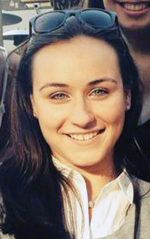
Madeline Kachou, a 2011 Cornwall High School graduate, will be moving on to the Intercollegiate Ethics Bowl championship, from Feb. 19 to 22 in Costa Mesa, Calif. She and her four teammates are part of the ethics team, from Marist’s School of Management, which beat out a field of 24 teams from 16 colleges and universities to win the Northeast Regional Ethics Bowl Championship held on Dec. 6 at Sacred Heart University in Fairfield, Conn.
“I couldn’t believe it,” said Kachou of the victory over Providence University.
The Providence team was made up of five philosophy majors while the Marist team is comprised of mostly business majors.
“It’s a little more challenging because we’re the only school in the northeast region, and one of the few nationally, that puts forth a team from a business school,” said Dr. Joanne Gavin, Professor of Management, Assistant Dean for Undergraduate Programs, and coach.
It will be Kachou’s second trip to the national competition. Although Marist didn’t win the northeast competition last year, a team did qualify as one of the 32 teams. When one of the students on the team wasn’t able to go, Kachou was chosen as a replacement.
Marist won two of three rounds and ended up placing 13th overall.
“It was nerve-wracking going up against 32 teams from all across the country,” Kachou said. “It was a win just to get to nationals, but to then win those two rounds and be ranked was incredible.”
During the regional competition, Kachou, a finance major with minors in accounting and psychology, presented two of the three cases she spent three months preparing.
The first case, presented in the second round of the competition, questioned whether states should enact laws prohibiting smoking in a car with children present. Kachou argued while it’s unethical to smoke with a child present, it’s also unethical to create laws taking away the rights of another.
“It’s up to the parent to parent the child and provide a stable and healthy environment they need to foster and grow as an individual,” Kachou said. “Parents who have a good moral conscience will not place a child in harm and do something with detrimental effects on the child.”
Kachou’s second case was presented in the finals. She had to argue the validity of firing the CEO of a company for his support of California’s Proposition 8, a ballot initiative to make same-sex marriages illegal.
Kachou’s argument questioned whether the same standards would be applied to someone who worked in an entry-level position within the same company.
“You’re placing the rights of that individual above another, and that’s unethical,” she said.
The ethics team started to review new cases in mid-January to prepare for the February championship.
“I’m nervous, but I’m also very excited,” Kachou said. “One thing I took from last year’s experience was the importance of teamwork and how important it was to work together as a team. Also, using our business knowledge was a huge differentiator for us which gave us an advantage.”
The goal this year is to make it to the second round. To do so will require “our use of ethical frameworks and applying what we know in philosophy to the ethical dilemma, because it is first and foremost an ethical competition.”
